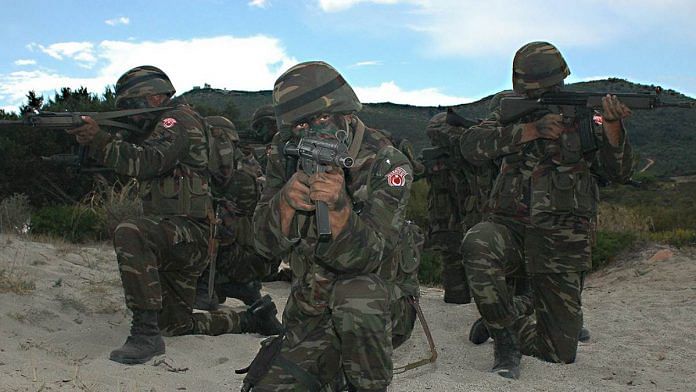New Delhi: In a much-criticised move, Turkey has announced its decision to send troops to aid the United Nations-backed Libyan government in Tripoli, increasing its involvement in the domestic politics of its war-torn western neighbour.
On 6 January, the Recep Tayyip Erdogan government said it will send troops in a bid to “ensure a ceasefire in Libya”.
Libya, which is seen as a failed state since 2011, is currently under two rival governments. The UN-recognised government of Tripoli has been fighting an insurgency by the forces of General Khalifa Haftar, who runs a parallel government from the city of Tobruk.
Over the past few years, Turkey’s involvement in Libya has grown steadily. However, the latest decision has taken that involvement to a new level. The move has been condoned by the US, the European Union, Egypt and Greece.
As international criticism pours in over the issue, ThePrint looks at the political landscape in Libya and why Turkey is moving in with greater aggression.
Libya since 2011
Chaos engulfed Libya after the fall of dictator Muammar Gaddafi, who was captured and killed on 20 October 2011 during the Battle of Sirte — the final battle of the first Libyan war — by the National Transitional Council (NTC) forces. The rebel forces fighting Gaddafi’s loyalists were backed by NATO and his killing led to massive insurgency in the North African country.
Three days after the death of Gaddafi, the NTC declared Libya in a state of “total liberation”. The NTC then formed a de facto government in Libya for about 10 months after Gaddafi’s death.
In 2012, fresh elections were held and power was transferred from the NTC to the General National Congress (GNC), and Ali Zeiden was sworn in as the Prime Minister, only to be ousted in 2014. Libya was yet again left grappling with violent conflicts.
These led to the breaking up of the country into two — with one government in Tobruk (in the east) and the other in Tripoli (in the west).
Amid the second, ongoing Libyan war, which broke out in 2014 between rival forces, the UN-led Libyan Political Agreement was signed to recognise the Government of National Accord (GNA) as the sole legislative and executive authority in Libya. In March 2016, Fayez al-Seraj took charge as the prime minister.
Also read: US and Iran appear to signal desire to avoid further conflict, but risks remain
The rival governments
The oil-rich country is now controlled by two rival forces, Fayez al-Seraj’s UN-backed GNA in Tripoli in the north-west and veteran military commander General Khalifa Haftar’s Libyan National Army (LNA) in the east.
While Turkey supports the struggling UN-backed government in Tripoli, Haftar is supported by Egypt, Russia and France.
Haftar had launched massive attacks on Tripoli in April last year, killing at least 180 people and wounding 800 in his initial attempt to seize it.
More recently, on 6 January, Haftar’s forces entered Sirte and claimed that they have control over the coastal city, including al-Qardabiya air base.
The coastal city is of great strategic importance to Haftar as it would have a wide physical and psychological threat on GNA government in Tripoli. Sirte’s fall would impact the self-governing city of Misurata, which provides key military power to defend the GNA hold.
Turkey’s growing involvement in Libya
While the two rival governments continue to wage war against each other, Turkish President Erdogan has claimed that the objective of deploying Turkish forces in Libya is “not to fight” but to support the “legitimate government and avoid human tragedy”.
His statement came in the backdrop of the economic agreement signed between Ankara and Tripoli, and Seraj’s government’s request for military assistance. The economic deal allows Turkey to explore gas reserves in the eastern Mediterranean region.
Turkey’s involvement in the politics of the oil-rich nation came after 2014 elections and the formation of the GNA government. The close ties between Turkey and Qatar also played a role in Erdogan’s intervention.
Ankara had aided Qatar in its 2017 diplomatic crisis when Qatari airlines and ships were blocked by Saudi Arabia, Bahrain, Egypt, Maldives and the Tobruk government. Now Qatar provides financial aid to the UN-backed GNA government and Turkey provides muscle power to fight the LNA.
The presence of Muslim Brotherhood in Fayez al-Seraj’s government is also of ideological interest to both Turkey and Qatar. Saudi Arabia, UAE and Egypt consider the Muslim Brotherhood as a terror organisation, and provide aid to LNA. Turkey had also provided support to the Islamist group’s Libyan forces to oust Muammar Gaddafi.
Another reason behind Turkey’s interest in the political landscape in Libya is to establish its influence in the Mediterranean coast. Libya borders the Mediterranean trade route which is home to many Turkish and other gulf companies.
Further, Ankara is involved in many construction projects in Libya and all the disturbances from Haftar’s forces adversely impacts its trade and business. It’s also wary of facing another influx of refugees.
Also read: US kills Iran’s Soleimani: Is it a wise act or Trump’s foolhardiness in an election year?
(Inputs from Qandeel Qazi)



